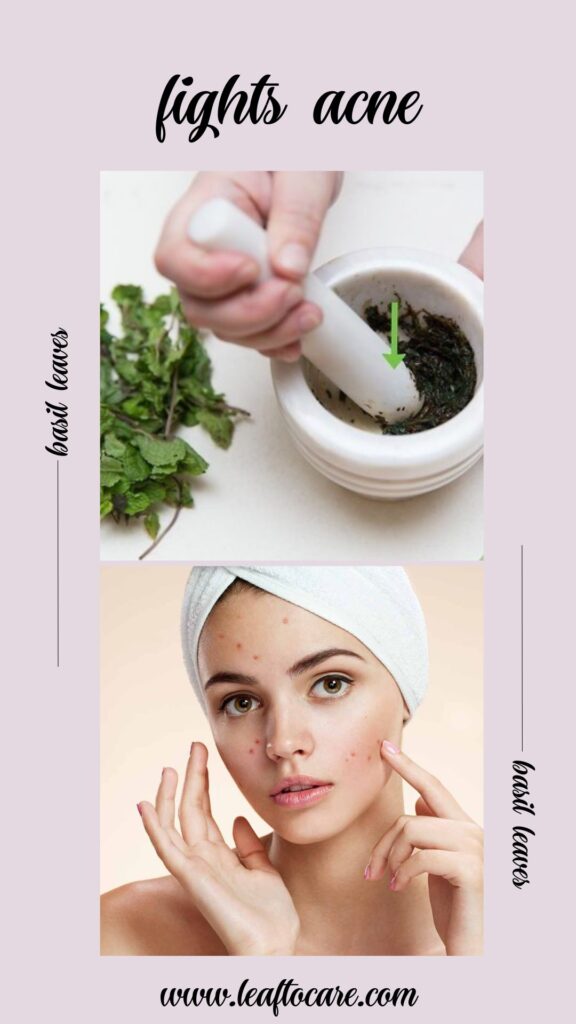Ayurveda, an ancient Indian healing practice, has some tips for taking care of your skin and hair. One important part of Ayurvedic beauty care is using natural herbs to make your skin look its best.One of these herbs is Tulsi, also called Holy Basil. According to tradition, Tulsi might help with acne, lower skin inflammation, and make your hair grow faster. But what does science say about it?Let’s explore the research to find out how How To Use Basil Leaves For Skin.
Holy Basil Leaves
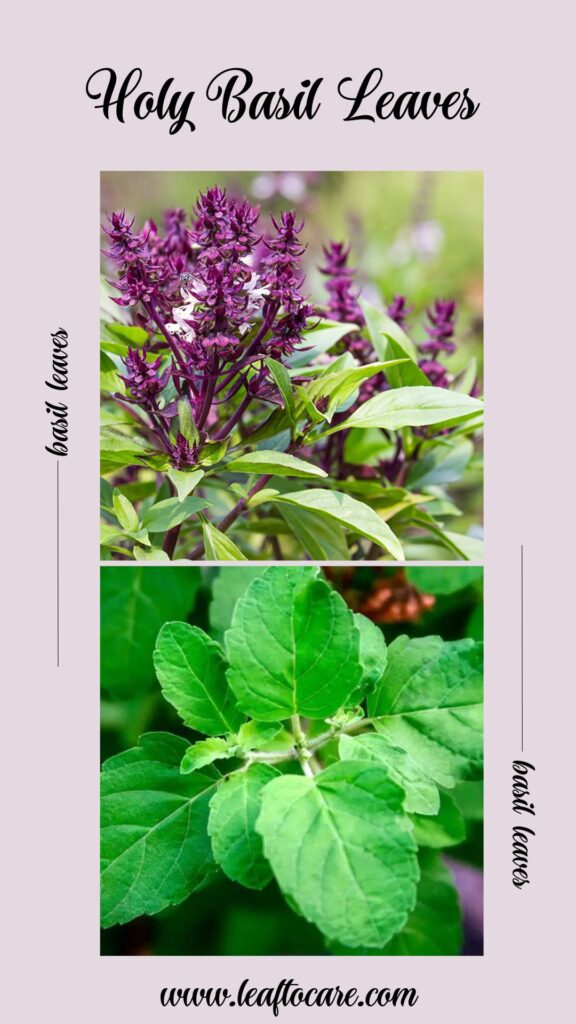
The holy basil plant, scientifically known as Ocimum sanctum L. and commonly referred to as Tulsi or Tulasi in India, is a leafy herb that belongs to the mint family. In India, there are three main variants of tulsi – Rama Tulsi, Krishna Tulsi, and Vana Tulsi. Each variant is used in a similar manner to treat various ailments, and they share a similar taste.
Holy basil is believed to be native to North Central India and thrives in the tropical regions of the eastern world. Cultivated for over 5,000 years, it is widely recognized as a culinary herb, especially prominent in Italian and Southeast Asian cuisines.
While that gives you a glimpse of the herb, the real advantages come from the ingredients it contains.
Tulsi benefits for skin

Although there is limited high-quality research on basil, some studies suggest that it may provide various benefits for the skin and hair. These potential benefits include:
- fights acne
- supports healthy skin ageing
- reduces pigmentation
- soothes skin conditions like eczema
Tulsi is like a natural superhero for your skin, especially if you have acne. It has properties that fight bacteria and reduce inflammation, tackling the things that cause those annoying breakouts. By using skincare products with Tulsi, you can clear up acne and stop it from coming back. So, whether your acne is mild or stubborn, Tulsi can be a helpful friend in taking care of your skin.
DIY

- Previously take a handful of basil leaves + 1 tbsp. Honey
- Grind the leaves and later add honey in it,
- Apply the pack on to the face and leave it for 15 min, until it dries out,
- Lastly rinse it off with water
Healthy skin ageing
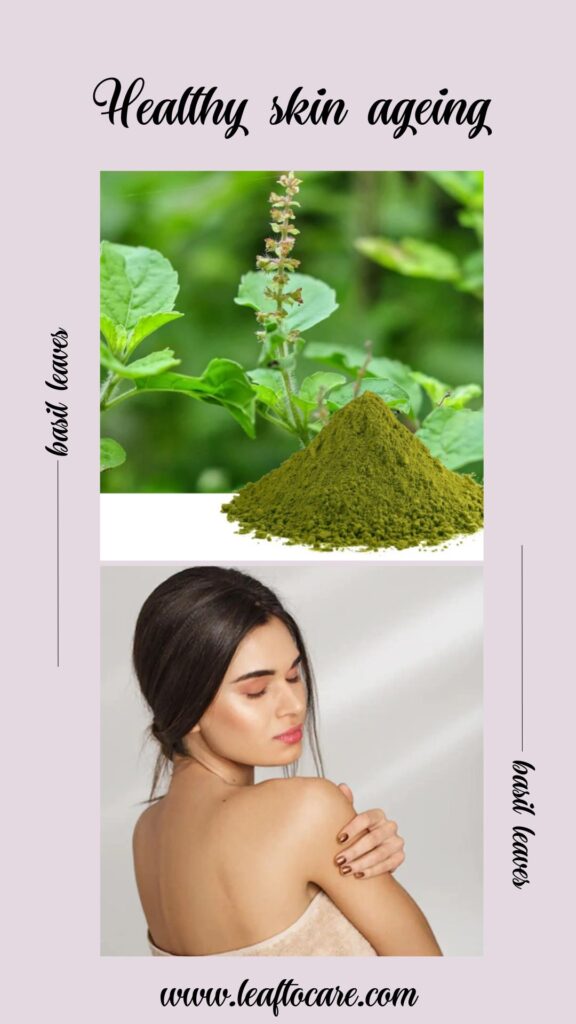
In a study from 2019, it was discovered that Tulsi has the potential to promote healthy skin aging. When applied directly to the skin, Tulsi showed strong antioxidant activity. Antioxidants are crucial for maintaining ageing skin because they help decrease the production of free radicals. Free radicals can lead to oxidative stress, harming skin cells and leading to the formation of fine lines and wrinkles.
Skin hydration
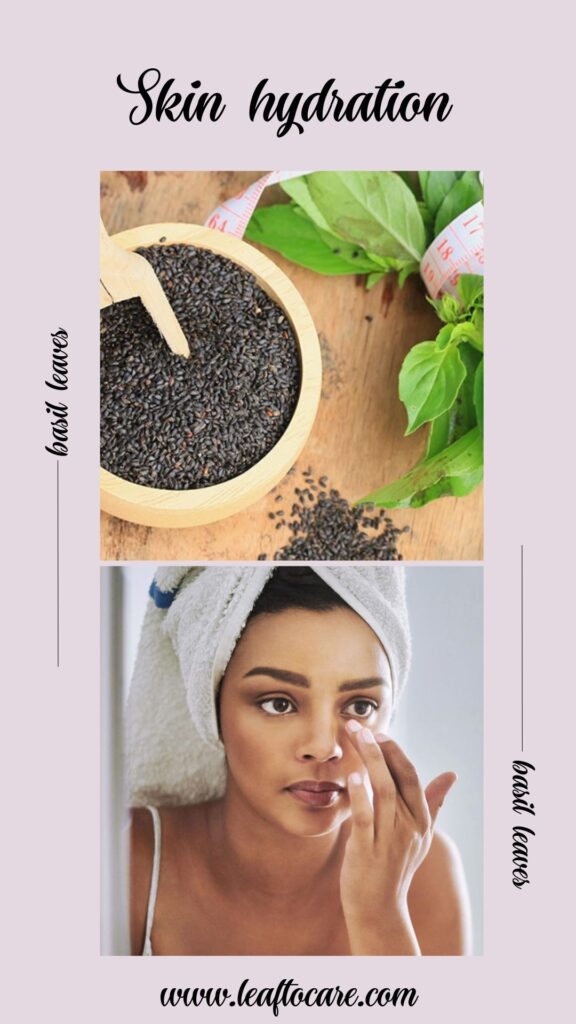
Basil leaves keep your skin moisturised and soft because it has natural moisturising properties. It has essential oils that deeply nourish the skin, making it perfect for dry or dehydrated skin. Using skincare products with basil leaves can bring back moisture to your skin, making it feel soft and smooth. Whether you want to prevent dryness or keep your skin healthy and moisturised, basil leaves are a great choice for your skincare routine.
DIY

- Firstly, take 6-7 leaves of basil and boil for 5 min in a glass of water,
- Let it cool and afterwards strain it into a clean bottle,
- Secondly, mix 10 drops of lemon juice and store it in a cool place.
- Finally your natural Toner is ready to use.
- So take a cotton ball and pour some toner and cleanse your skin daily with it, Repeat it twice daily.
Remove Blackheads from roots!
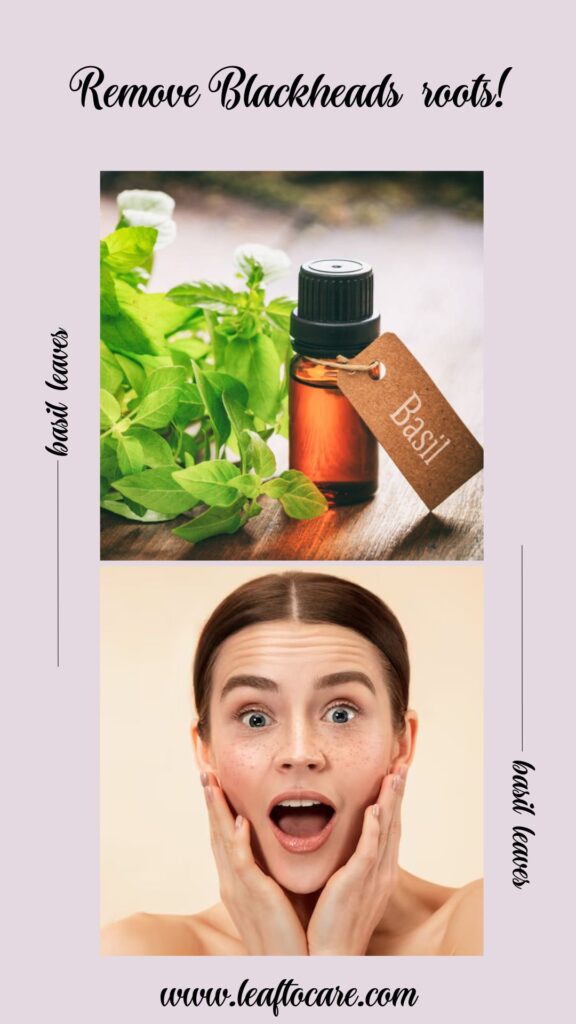
The camphene in basil leaves helps eliminate blackheads and whiteheads, soothing red bumps quickly. The oils in basil leaves not only fade spots left by blackheads but also remove excess oil, unclogging pores in the process.
DIY
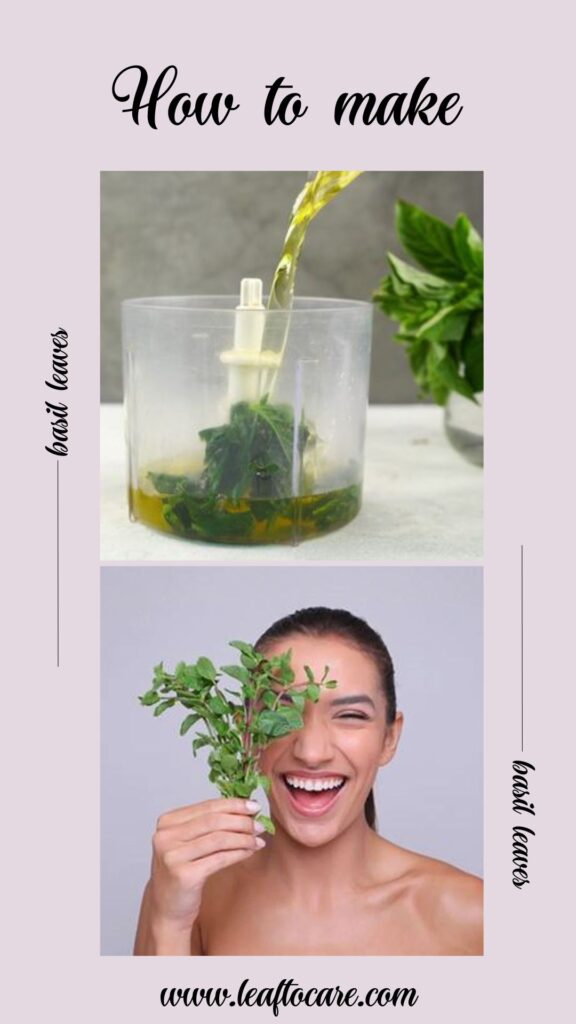
Firstly, boil basil leaves in water for 6-8 minutes. Remove from heat, tie your hair back, and position your face close to the vessel with the liquid. Absorb the steam for 10 minutes, then use a blackhead removal tool gently to get rid of blackheads.
Basil leaves are rich in vitamin C, a natural skin-brightening element. Vitamin C, being a strong antioxidant, reduces the visibility of dark spots and hyperpigmentation, promoting a brighter and more even skin tone. Using skincare products with Tulsi extract or oil can bring radiance and a healthy glow to your skin. Moreover, Tulsi’s anti-inflammatory properties can help minimise redness and irritation, preventing a dull complexion. For brighter skin and an even complexion, including Tulsi in your skincare routine is a smart choice.
DIY
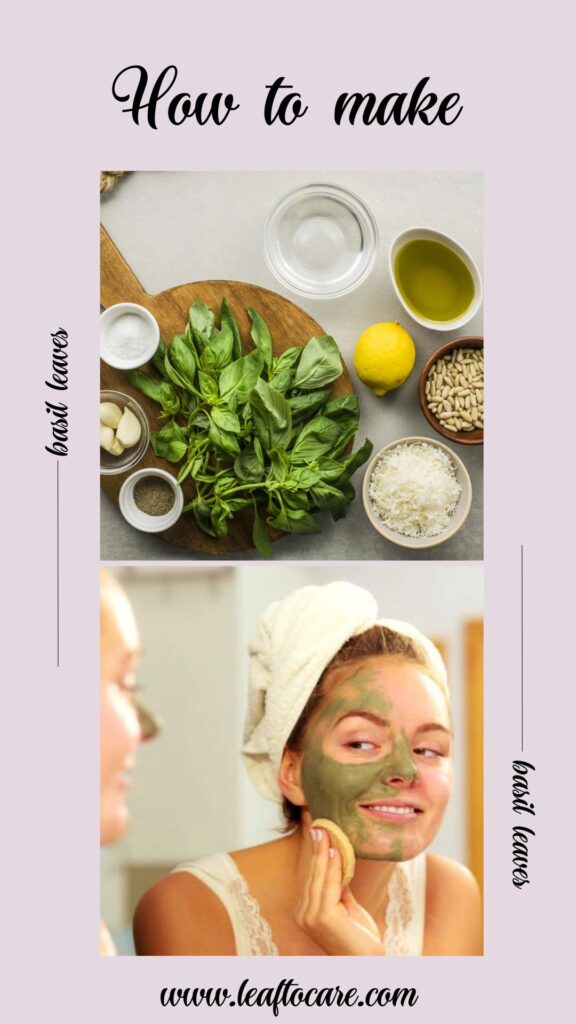
- Firstly, take 6-7 leaves of basil and boil for 5 min in a glass of water,
- Let it cool and afterwards strain it into a clean bottle,
- Secondly, mix 10 drops of lemon juice and store it in a cool place.
- Finally your natural Toner is ready to use.
- So take a cotton ball and pour some toner and cleanse your skin daily with it, Repeat it twice daily.
Treats Vitiligo And Eczema
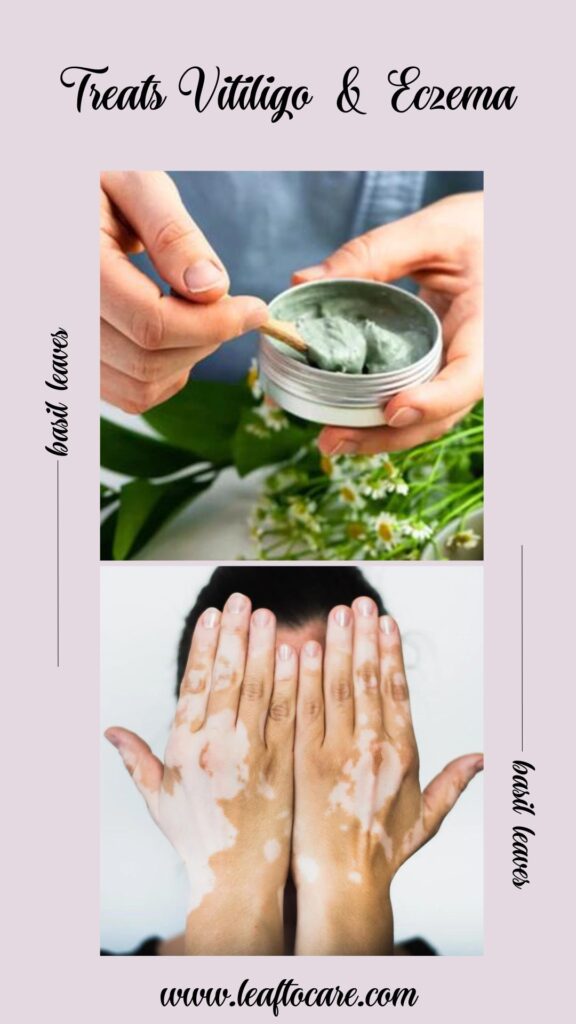
Consuming basil leaves regularly may help improve symptoms of vitiligo, and it can also show similar effects on eczema. There is research suggesting that the antioxidant activity of tulsi may contribute to treating eczema.
However, since ongoing research is still being conducted, it is advisable to consult your doctor before using basil for these purposes. The concentration and specific application of the herb can vary, and professional medical advice will ensure safe and effective usage.
DIY

- Firstly take a fresh handful of basil leaves,
- Secondly, grind it to get a paste,
- Thirdly, apply directly on to the affected areas and leave until dry,
- Lastly, wash it off with water.
- Without a doubt use it daily for effective results.
Avoid direct sun rays after the application of raw ingredients.
Conclusion
In conclusion, using basil leaves for the skin can do wonders. Boiling them, inhaling the steam, and using skincare products with Tulsi can make your skin softer, more moisturised, and even brighter. Basil’s anti-inflammatory properties may also help with conditions like eczema, and regular consumption might have positive effects on vitiligo symptoms. However, it’s important to check with a healthcare professional before making basil a regular part of your skincare routine, especially if you have specific skin concerns, to ensure it’s safe and effective for you.

